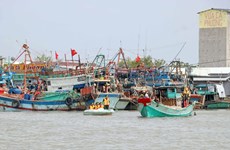Auto sales fall 41 percent in first half
Automobile sales in Vietnam fell an historic 41 percent year-on-year
in the first six months of 2012, an industry group said on July 11,
slowed by the economic recession.
Total vehicle sales for the first half reached just 42,928 units, the Vietnam Association of Automobile Manufacturers (VAMA) said in a statement.
Total vehicle sales for the first half reached just 42,928 units, the Vietnam Association of Automobile Manufacturers (VAMA) said in a statement.
Automobile sales in Vietnam fell an historic 41 percent year-on-year
in the first six months of 2012, an industry group said on July 11,
slowed by the economic recession.
Total vehicle sales for the first half reached just 42,928 units, the Vietnam Association of Automobile Manufacturers (VAMA) said in a statement.
While car sales fell by 47 percent to 16,305 units, sales of trucks also slipped 30 percent to 26,929 units.
In June, 6,444 vehicles are sold, down 43 percent over the corresponding period last year, and 4.6 percent compared to the previous month, it added.
According to VAMA's chairman Laurrent Charpentier, auto sales for the year are projected to hit around 80,000 units given the slow start.
The Ministry of Industry and Trade in April also forecast that Vietnam 's total car sales in 2012 will drop drastically and return to 2007's level of some 80,000 units.
Last year, sales reached 138,000 units, a drop of 5 percent compared to the previous year.
However, in a statement sent to the media on July 11, VAMA said: "It is a very encouraging sign that the Government and the Ministry of Transport are revising their position with regards to the new set of fees they had planned to implement."
The statement came after VAMA received a letter from the Ministry of Transport (MOT) last week in response to an invitation from the association to meet and discuss the series of fees the ministry is working on.
The ministry earlier this year proposed car ownership fees under which each car owner will have to pay from 20-50 million VND per year in a move to try and restrict rising car numbers that cause chronic traffic congestion.
However, the letter from the MOT stated that it will be looking into the matter further and taking advice from relevant ministries as well as public opinion before making a final decision.
"The letter may signal a better sales outlook for 2012," said Charpentier.
VAMA in March asked the Government to postpone the implementation of a series of car fees initiated by the MOT, saying the Government should first build a policy to develop and diversify the transportation network.
If the proposed fees are applied, it will be impossible to achieve the Government's auto development plan toward 2020, which is regarded as a pillar of the country's economy.
Then Vietnam will have to spend approximately 12 billion USD per year on car imports, which will negatively effect the trade balance, VAMA says.
The recession in the local auto industry will also dim the annual contribution of the sector to the State budget, which is estimated at 2 billion USD annually.-VNA
Total vehicle sales for the first half reached just 42,928 units, the Vietnam Association of Automobile Manufacturers (VAMA) said in a statement.
While car sales fell by 47 percent to 16,305 units, sales of trucks also slipped 30 percent to 26,929 units.
In June, 6,444 vehicles are sold, down 43 percent over the corresponding period last year, and 4.6 percent compared to the previous month, it added.
According to VAMA's chairman Laurrent Charpentier, auto sales for the year are projected to hit around 80,000 units given the slow start.
The Ministry of Industry and Trade in April also forecast that Vietnam 's total car sales in 2012 will drop drastically and return to 2007's level of some 80,000 units.
Last year, sales reached 138,000 units, a drop of 5 percent compared to the previous year.
However, in a statement sent to the media on July 11, VAMA said: "It is a very encouraging sign that the Government and the Ministry of Transport are revising their position with regards to the new set of fees they had planned to implement."
The statement came after VAMA received a letter from the Ministry of Transport (MOT) last week in response to an invitation from the association to meet and discuss the series of fees the ministry is working on.
The ministry earlier this year proposed car ownership fees under which each car owner will have to pay from 20-50 million VND per year in a move to try and restrict rising car numbers that cause chronic traffic congestion.
However, the letter from the MOT stated that it will be looking into the matter further and taking advice from relevant ministries as well as public opinion before making a final decision.
"The letter may signal a better sales outlook for 2012," said Charpentier.
VAMA in March asked the Government to postpone the implementation of a series of car fees initiated by the MOT, saying the Government should first build a policy to develop and diversify the transportation network.
If the proposed fees are applied, it will be impossible to achieve the Government's auto development plan toward 2020, which is regarded as a pillar of the country's economy.
Then Vietnam will have to spend approximately 12 billion USD per year on car imports, which will negatively effect the trade balance, VAMA says.
The recession in the local auto industry will also dim the annual contribution of the sector to the State budget, which is estimated at 2 billion USD annually.-VNA













